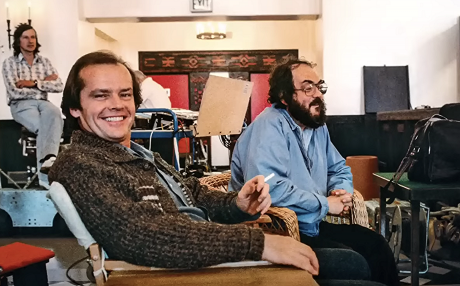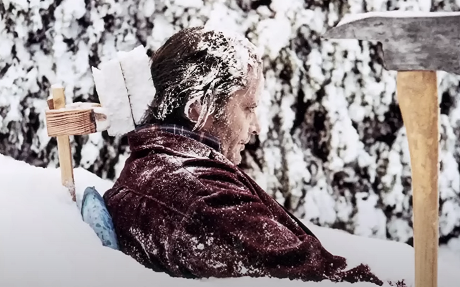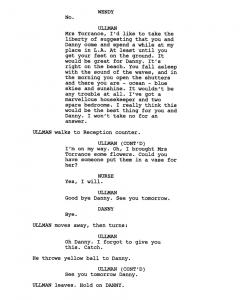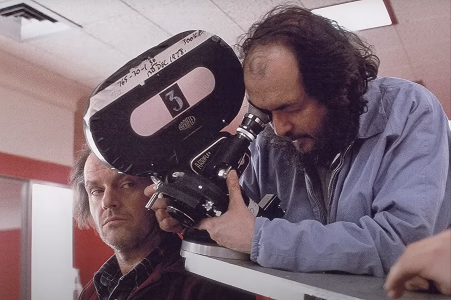Obsessive fans of Stanley Kubrick‘s The Shining have been carrying the torch for decades, and apparently will never quit. I wouldn’t necessarily include myself, although I’ve seen Stanley Kubrick’s 1980 horror film at least 11 or 12 times.
My first reaction was subdued bordering on disappointed, but the film has gradually expanded or deepened in my head over the years, which is significant considering that it’s not especially scary and is more noteworthy for its perverse sense of humor than anything else. Which makes it, of course, rewatchable as fuck. For people like me, that is.
Every time I watch the Jack-and-Wendy baseball bat scene, I chuckle or even laugh out loud at Jack Nicholson‘s twitchy unhinged wackazoid, which is total Kabuki theatre. And I adore Nicholson’s Delbert Grady interrogation in the bright red bathroom. Not to mention the chat with Lloyd the bartender, although I would have preferred it if Lloyd had said the Richard Price line from Mad Dog and Glory — “women…can’t live with ‘em, can’t kill ’em.”
All to say that if money was no object I would be tempted to buy Lee Unkrich’s new Shining book, an ultra-meticulous cataloguing of the entire effort, start to finish. Call it the ultimate obsessive Shining fan publication, made by and for wealthy people.


The Taschen publication is priced at $1500. It took Unkrich a dozen years to put it all together. He apparently talked to damn near everyone who had ever worked on it or who knew or had heard anything.
Two days ago IndieWire‘s Bill Desowitz posted an interview with Unkrich. I spoke to Desowitz yesterday. Our conversation focused on two areas of interest — (a) the fact that Unkrich has never seen the missing second-to-last scene in which Barry Nelson‘s Overlook Hotel manager, “Mr. Ullman”, visits Shelley Duvall‘s “Wendy Torrance” in a Denver hospital following the death of Jack Nicholson‘s “Jack Torrance”, and (b) the number of takes used to shoot the hotel staircase baseball bat scene.
I, Jeffrey Wells, am one of the few living souls on this planet to have seen the hospital visit scene. I saw it a few weeks before The Shining opened on 10.2.80. The print I saw was 146 minutes long, and the venue was the old Warner Bros. screening room at 75 Rockefeller Plaza.
Desowitz told me yesterday that he too saw this scene, albeit shortly after the movie opened. The 146-minute cut was shown commercially in Westwood for a week or less. Kubrick hired an editor to remove the scene from prints playing in Los Angeles and New York.
The scene is nothing special, I can tell you. Not a “bad” scene, but definitely a ho-hummer. The narrative energy drops significantly, and it basically adds very little to the whole. Roughly ten years ago Unkrich posted the dialogue. I’ve posted it after the jump.
Unkrich’s Shining book includes a couple of frame captures from the hospital scene.
How many times was the baseball bat scene shot? No more than 15, Desowitz says. The scene with the most takes is the one in which Jack, Wendy and Danny are being shown the golden ballroom by Ullman — 66 takes in all.
Desowitz: “Unkrich’s search for the Holy Grail — the deleted hospital epilogue where hotel manager Ullman (Barry Nelson) visits Wendy and Danny and tells them that nothing out of the ordinary occurred at The Overlook — was unsuccessful, save for some rare color frames that have been restored and reproduced in the book. Kubrick ordered the scene cut by editors in L.A. and New York after the opening weekend and before wider release.
“It is speculated that audiences found [the hospital scene] too confusing. All excised scenes were returned directly to Kubrick and were subsequently destroyed.”
Scene summary: “After we leave Jack Torrance (Jack Nicholson) frozen in the hedge maze, we cut to a hospital where Overlook manager Stuart Ullman (Barry Nelson) is visiting a recovering Wendy Torrance (Shelley Duvall) along with her son Danny (Danny Lloyd). After some pleasantries that are oddly casual for those recovering from an axe murder, Ullman tells Wendy that investigators searching the hotel ‘didn’t find the slightest evidence of anything at all out of the ordinary,’ and that, amid the trauma, she must have simply been hallucinating.
“After inviting Wendy and Danny to leave to come stay with him in Los Angeles, Ullman begins to leave but remembers that he forgot to give something to Danny, and throws him a yellow tennis ball.”



